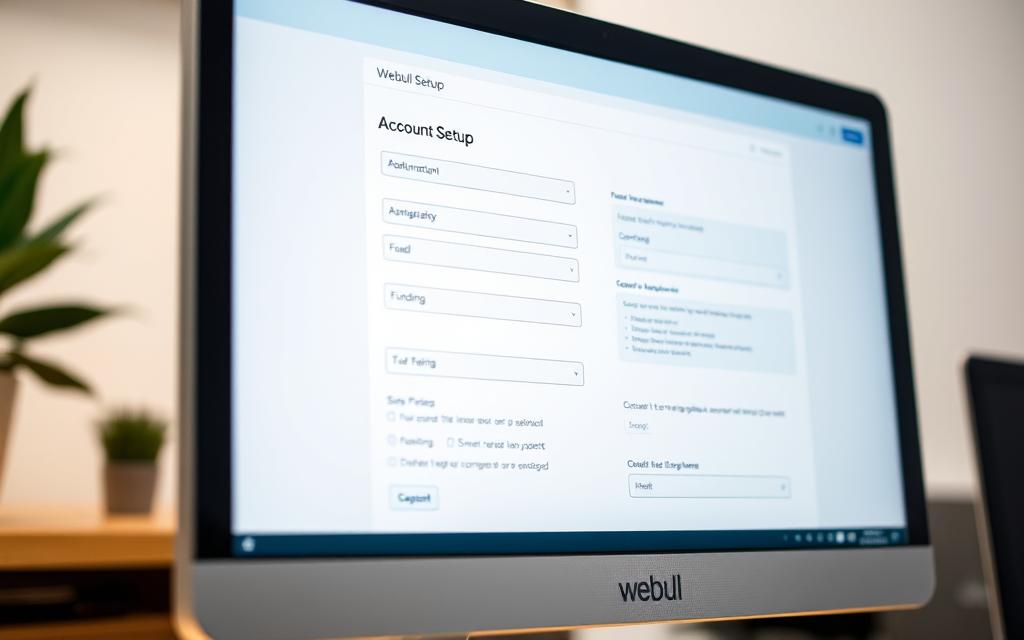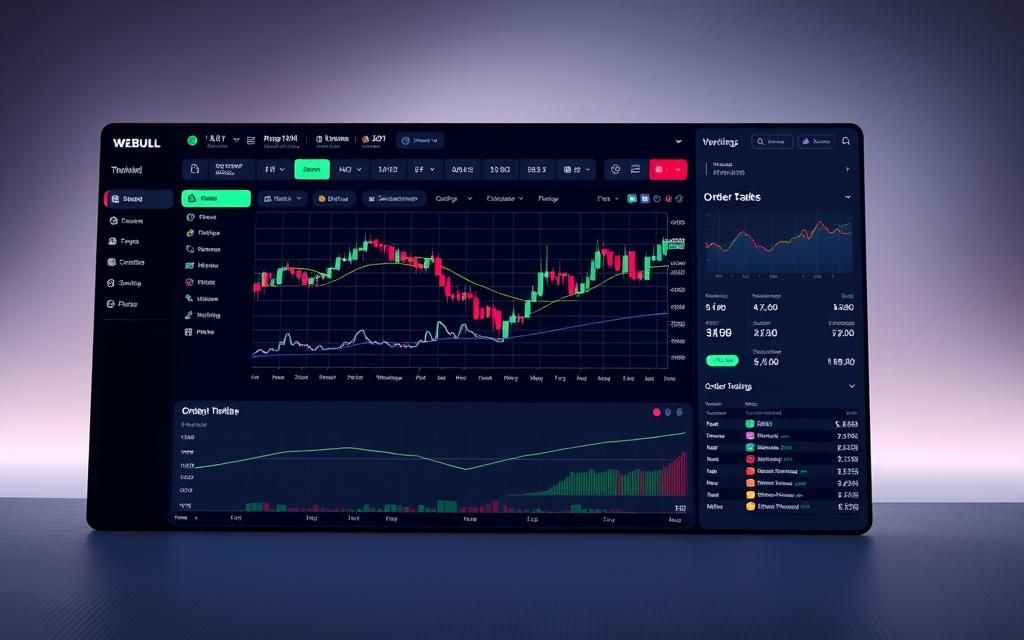Table of Contents
Webull offers a hybrid platform for investors looking to diversify their portfolios. The platform supports digital assets alongside traditional stocks, making it a versatile choice. Commission-free trading is available, which appeals to both beginners and experienced traders.
Currently, eight major cryptocurrencies are supported, including Bitcoin and Dogecoin. Fractional purchases allow users to invest small amounts, lowering the entry barrier. Unlike traditional exchanges, Webull simplifies the process with a mobile-first approach.
Regulatory compliance with SEC and FINRA ensures a secure trading environment. However, transferring assets off the platform isn’t permitted. The next section will guide you through the account setup process.
Introduction to Webull and Cryptocurrency Trading
Founded in 2017, Webull has rapidly evolved into a multi-asset trading platform. Initially focused on stocks, it expanded to include digital currencies like Bitcoin and Ethereum. This shift reflects growing demand for diversified investment options.
The mobile app, launched in 2018, offers a streamlined interface for 24/7 crypto trading. Unlike traditional exchanges, Webull allows fractional purchases, making it accessible to beginners. Its design prioritizes speed and ease of use.
Regulatory compliance is a cornerstone. Webull is SEC/FINRA-regulated and offers SIPC protection up to $500k. Assets are further secured through Apex Clearing, ensuring robust safeguards for investors.
Current crypto offerings include:
- Bitcoin (BTC)
- Ethereum (ETH)
- Dogecoin (DOGE)
- Litecoin (LTC)
Webull converts “brokerage cash” to digital assets seamlessly. However, availability varies by state due to local regulations. Future updates may introduce wallet integration, enhancing flexibility.
The community feed feature enables social trading, while built-in tax tools simplify reporting. For traders weighing options, Webull’s commission-free model contrasts with Robinhood’s similar approach but adds deeper analytics.
What Is Webull?
Webull stands out as a modern trading platform blending traditional and digital assets. Its SEC/FINRA registration ensures compliance with U.S. financial regulations. The platform integrates stocks and cryptocurrencies under one interface.
Webull’s Regulatory Compliance
Investor protection is a priority. Webull partners with Apex Clearing, providing $150M insurance for cash and securities. Cryptocurrencies are executed through Apex Crypto LLC, which operates under separate protocols.
- SIPC protection up to $500k for brokerage accounts
- Two-factor authentication for account security
- Real-time monitoring for suspicious activity
Webull’s Crypto Offerings
The platform supports eight major cryptocurrencies, ranked by market capitalization:
| Asset | Market Cap Rank | Notable Feature |
|---|---|---|
| Bitcoin (BTC) | 1 | Pioneer cryptocurrency |
| Ethereum (ETH) | 2 | Smart contract platform |
| Dogecoin (DOGE) | 10 | Community-driven meme coin |
| Litecoin (LTC) | 21 | Faster transaction speeds |
Fractional trading allows investments as small as $1. Unlike traditional exchanges, Webull simplifies access through its mobile app. Future updates may expand the asset selection.
Note: Crypto assets aren’t SIPC-insured but benefit from Apex’s custody solutions. Always review regional availability before opening a webull account.
Setting Up Your Webull Account
Getting started with Webull is straightforward, whether you’re a first-time trader or an experienced investor. The platform’s registration process is optimized for speed, typically taking under 20 minutes with identity verification. Supported in 50+ countries, including the U.S., India, and South Korea, it caters to a global user base.

Account Registration Process
To create an account, provide basic details like your name, email, and phone number. Webull requires additional verification for security:
- Upload a government-issued ID (e.g., driver’s license or passport).
- Enter your Social Security Number (SSN) for U.S. residents.
- Complete a brief questionnaire about your trading experience.
Approval is usually instant but may take up to 24 hours if manual review is needed. Enable two-factor authentication (2FA) during setup for added protection.
Linking Your Bank Account
Funding your bank account is seamless via ACH transfers. Webull partners with major U.S. institutions like Chase, Bank of America, and Wells Fargo. Note these key details:
- Instant deposits (up to $1,000) are available for immediate trading.
- Settled funds (3–5 business days) allow larger transactions.
- IRAs have separate funding rules compared to individual accounts.
State restrictions apply for crypto trading—check Webull’s website for eligibility. If issues arise during setup, their 24/7 support team assists with troubleshooting.
Funding Your Webull Account
Before diving into digital asset trading, understanding how to fund your account is crucial. Webull provides multiple options to add money, each with unique processing times and limits. This section breaks down deposit methods, buying power rules, and common troubleshooting steps.
Understanding Buying Power
Buying power refers to the amount available for immediate trades before funds fully settle. Webull offers Instant Buying Power (IBP), a provisional credit up to $1,000 during ACH transfers. Key details:
- IBP activates within minutes for deposits under $1,000
- Funds exceeding $1,000 become available after 4 business days
- Time zones affect credit availability—deposits after 4 PM ET process next morning
Margin accounts provide additional flexibility but require minimum balances. For a deeper look at IBP mechanics, explore this guide on Webull’s buying power.
Deposit Methods and Timelines
Webull supports two primary ways to add cash:
- ACH Transfers: Free, 4-day settlement, with $1,000 instant access
- Wire Transfers: Faster (1 business day) but incur $8-$25 fees
International users should note currency conversion fees. Minimum deposits start at $1, while withdrawals face 5-day holds for security. Always verify bank linking to avoid delays.
For smooth transactions:
- Use supported banks like Chase or Bank of America
- Enable overdraft protection if transferring large sums
- Contact support if deposits don’t reflect within 48 hours
How to Trade Crypto on Webull
Mastering digital asset trades on Webull starts with understanding its streamlined interface. The platform combines real-time analytics with fractional purchase options, making crypto assets accessible from $1. Key tools like price alerts and recurring investments simplify portfolio management.

Navigating the Trading Interface
Webull’s dashboard organizes essential features for efficient trading:
- Real-time charts with 25+ technical indicators
- Order book depth showing bid/ask spreads
- Customizable price alerts via SMS or email
- Tax lot selection for optimizing capital gains
For example, the recurring investment tool automates purchases weekly or monthly. This dollar-cost averaging reduces market timing risks.
Placing a Crypto Order
Three order types accommodate different strategies:
| Order Type | Execution | Best For |
|---|---|---|
| Market | Instant at current price | Quick buy crypto actions |
| Limit | Only at set price | Controlled entries/exits |
| Stop-Limit | Triggers limit order after stop price | Risk management |
Settlements complete within minutes for market orders. Failed transactions trigger instant notifications with resolution steps. Portfolio trackers update dynamically to reflect new positions.
Pro Tip: Combine limit orders with price alerts to capitalize on volatility without constant monitoring. Webull’s mobile app supports all features for on-the-go adjustments.
Webull’s Crypto Trading Fees
Understanding Webull’s fee structure is essential for cost-effective trading. While advertised as commission-free, the platform incorporates a 1% spread markup on digital asset transactions. This built-in cost affects purchase and sale prices differently than traditional exchange fees.

Spread Markup Breakdown
The 1% spread represents the difference between buying and selling prices. For example, purchasing $100 of Bitcoin actually costs $101 due to this markup. This approach differs from platforms like Coinbase that charge separate trading fees per transaction.
Key spread characteristics:
- Applied to both market and limit orders
- Not visible as a separate line item
- Varies slightly by cryptocurrency
Comparative Fee Analysis
Webull’s model competes with industry standards:
| Platform | Fee Type | Cost for $100 Trade |
|---|---|---|
| Webull | 1% Spread | $1 |
| Coinbase | 1.49% + $0.99 | $2.48 |
| Binance US | 0.1% Maker Fee | $0.10 |
Additional Cost Considerations
Beyond the spread, traders should account for:
- Wire transfers: $8-$25 per transaction
- Third-party payment processor charges (up to 3%)
- Tax reporting services ($50 annual fee)
Webull doesn’t charge inactivity or corporate action fees. Their premium subscription ($5/month) unlocks advanced analytics without affecting the basic 1% spread. Historical data shows the markup remained stable since 2021.
Security Measures on Webull
Protecting your investments starts with robust security measures. Webull combines advanced technology with user-controlled protocols to minimize risks. Whether trading stocks or digital assets, these layers ensure your data and funds remain secure.

Account Protection Tips
Webull’s encryption standards match banking-level security. All data transfers use 256-bit AES protocols, preventing unauthorized access. Device authorization management lets you review and revoke linked devices instantly.
Key features to enhance safety:
- Session timeouts: Automatic logouts after 30 minutes of inactivity
- Phishing attempt alerts: Real-time notifications for suspicious login attempts
- Cold storage for assets: 95% of crypto funds are offline to prevent hacks
FDIC insurance covers cash balances up to $250k, but cryptocurrencies aren’t included. Two-factor authentication (2FA) via SMS or authenticator apps adds an extra verification step. Address whitelisting restricts withdrawals to pre-approved wallets only.
For assistance, customer support responds within 2 hours via live chat. Historical incident reports show zero breaches since 2020, reflecting Webull’s commitment to user safety.
Pros and Cons of Trading Crypto on Webull
Evaluating Webull’s crypto features reveals both strengths and gaps for traders. The platform streamlines the way investors manage portfolios but lacks niche offerings like staking. Below, we break down key advantages and limitations.
Benefits of Webull for Crypto Traders
Tax optimization tools simplify reporting with automated capital gains calculations. The platform also supports fractional shares, enhancing portfolio diversification capabilities.
Social trading communities provide real-time insights, while advanced charting packages rival dedicated exchanges. Webull’s mobile and web parity ensures a seamless experience across devices.
“Webull’s integrated approach saves time for multi-asset traders.”
Limitations of Webull for Crypto Traders
Only eight coins are available—far fewer than competing services like Binance (350+). Missing features include staking rewards, NFT trading, and crypto lending programs.
Corporate actions and dividend reinvestment options are limited. Planned wallet integration could address some experience gaps, but timelines remain unclear.
- Pros:
- Commission-free trading
- Fractional purchases from $1
- Robust security protocols
- Cons:
- No external transfers
- Restricted asset selection
- Lacks passive income options
Webull vs. Other Crypto Trading Platforms
Investors weighing Webull against alternatives should analyze liquidity, asset diversity, and security protocols. While the platform excels in integrated stock/crypto access, specialized exchange platforms offer deeper functionality for digital assets.
Webull vs. Binance
Binance dominates with 350+ supported coins versus Webull’s eight, catering to niche traders. Key contrasts include:
| Feature | Webull | Binance |
|---|---|---|
| Derivatives Trading | ❌ Not available | ✅ Futures & options |
| API Access | Basic endpoints | Full trading/algo support |
| Fiat Withdrawals | 3-5 business days | Instant (debit cards) |
Binance’s global liquidity pools enable tighter spreads, while Webull’s 1% markup suits occasional traders. Educational resources also differ—Binance Academy offers 500+ guides versus Webull’s 30 video tutorials.
Webull vs. Coinbase
Coinbase allows external wallet transfers, a feature Webull lacks. Their crypto exchange models diverge in three areas:
- KYC Requirements: Coinbase mandates ID verification for all tiers; Webull permits limited trading during approval
- Institutional Services: Coinbase Prime provides OTC desks, while Webull focuses on retail investors
- Mobile Experience: Both score 4.7+ on app stores, but Webull’s charts outperform for technical analysis
“Coinbase suits long-term holders needing custody control, whereas Webull integrates better with traditional portfolios.”
Bankruptcy protections differ—Coinbase holds 100% cold storage reserves, while Webull relies on Apex Clearing’s $150M insurance. For active traders, Webull’s commission-free model may offset its limited coin selection.
Tips for Successful Crypto Trading on Webull
Maximizing returns in digital asset markets requires strategic planning and the right tools. Webull provides 50+ technical indicators and real-time data streams to inform decisions. These resources help traders identify trends while managing volatility risks.
Essential Market Research Tools
Custom watchlists track price movements for prioritized assets. The platform integrates earnings calendars and short interest data, revealing market sentiment shifts.
Key features for analysis:
- Volatility scanners flag high-movement opportunities
- Correlation matrices compare asset relationships
- News sentiment analysis gauges media impact
Paper trading simulates real-market conditions without risking money. This practice mode uses historical data to test strategies.
Proven Risk Management Strategies
Position sizing calculators determine optimal investment amounts per trade. Stop-loss orders automatically exit positions at predefined thresholds.
Advanced techniques include:
- Tax-loss harvesting to offset capital gains
- Portfolio rebalancing every quarter
- Diversification across uncorrelated assets
“Risk management separates consistent performers from speculative gamblers.”
These steps create disciplined habits for long-term growth. Combine them with Webull’s alerts to stay proactive in fast-moving markets.
Conclusion
For investors balancing stocks and digital assets, Webull provides a unified solution. Its fractional trading and robust security cater to both beginners and seasoned traders. The platform excels for those prioritizing convenience over advanced crypto features.
Future updates may expand asset options, but current limitations like restricted transfers remain. Diversify with traditional investments to mitigate volatility risks. Always prioritize tax compliance and continuous learning.
Explore alternatives if niche crypto tools are essential. Webull’s competitive edge lies in its hybrid approach—ideal for streamlined portfolio management.
FAQ
Is Webull a regulated platform for cryptocurrency trading?
Yes, Webull operates under strict regulatory oversight, ensuring compliance with financial authorities. This provides users with a secure environment for trading digital assets.
What cryptocurrencies are available on Webull?
Webull supports major cryptocurrencies like Bitcoin, Ethereum, and Dogecoin. The platform periodically updates its offerings, so check the latest list before trading.
How do I link my bank account to fund crypto purchases?
Navigate to the deposit section in your account settings. Follow the prompts to connect your bank via ACH transfer, which typically takes 1-3 business days to process.
Does Webull charge fees for crypto transactions?
Webull offers commission-free trading, but spreads and regulatory fees may apply. Always review the fee structure before executing trades.
How does Webull protect my crypto assets?
The platform uses advanced encryption, two-factor authentication, and segregated accounts to safeguard funds. However, Webull doesn’t support external wallet transfers.
Can I trade crypto 24/7 on Webull?
No, cryptocurrency trading follows market hours (4 AM – 8 PM ET). This differs from traditional crypto exchanges that operate continuously.
What’s the minimum deposit required to start trading?
There’s no minimum deposit, but you’ll need sufficient buying power to purchase fractional shares of crypto assets.
How does Webull compare to dedicated crypto exchanges?
While offering fewer coins than platforms like Binance, Webull provides integrated stock and crypto trading with robust analytical tools in one interface.
What happens if I encounter issues with crypto trades?
Contact customer support through the app or website. Response times vary, so consider checking the help center for immediate solutions.
Are there tax implications for crypto trading on Webull?
Yes, the IRS treats cryptocurrencies as property. Webull provides tax documents, but consult a tax professional for specific guidance.









